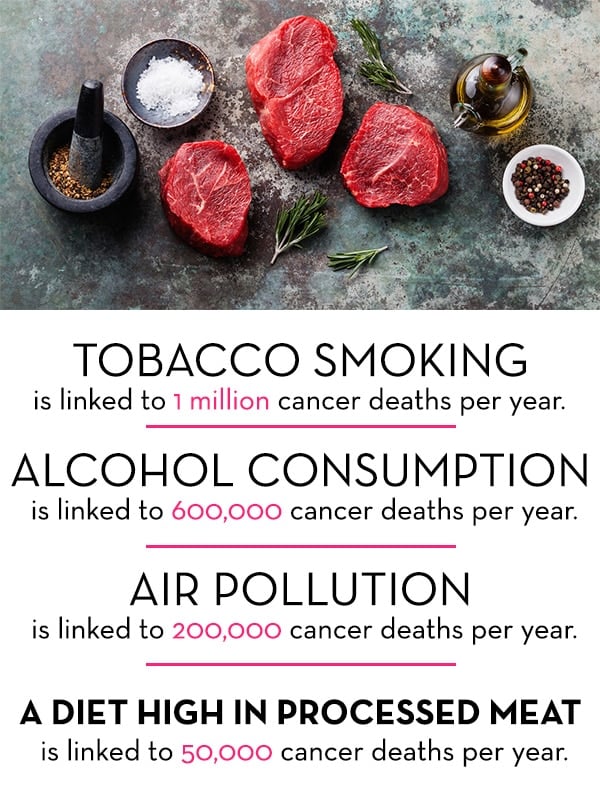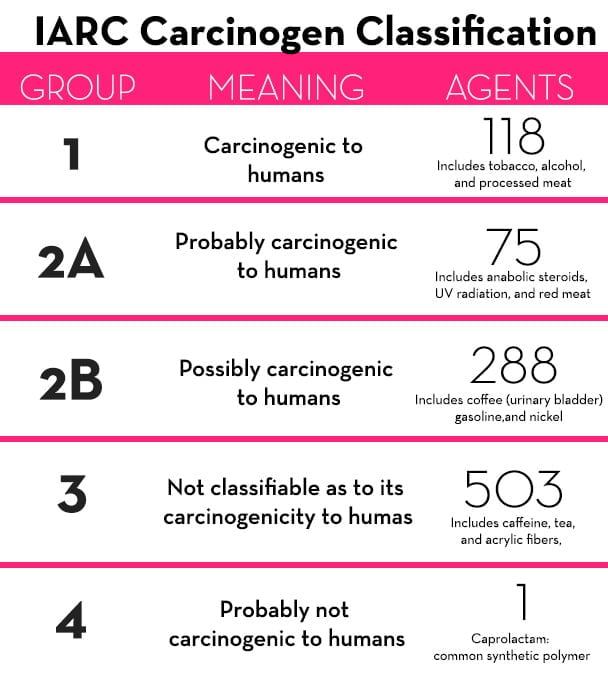Medically Reviewed By
Gaby Vaca-Flores, RDN, CLE
Registered Dietitian Nutritionist
It’s probably the biggest news story in nutrition and has already crashed the website of the World Health Organization (WHO). What is the relationship between meat and cancer?
In case you haven’t heard, yesterday (October 25) the World Health Organization released a report saying that processed meats (think sausage, ham, and bacon) cause cancer, and unprocessed red meat may also be carcinogenic.
To be clear, there is a difference between eating red meat and processed meat. While eating processed meat has been categorized as causing cancer, the evidence for red meat causing cancer is less strong but nevertheless exists.
If the reported associations are proven to be true, the Global Burden of Disease Project has estimated that diets high in processed meat could be responsible for 50,000 cancer deaths per year worldwide.
To put this into perspective, let’s look at how these numbers contrast with other known carcinogens, or substances capable of causing cancer.
 There are about 1 million cancer deaths per year globally due to tobacco smoking, 600,000 per year due to alcohol consumption, and more than 200,000 per year due to air pollution.
Unfortunately, as is often the case, mainstream journalism takes facts out of context to boost the appeal of a story. So what are the facts? Should you worry about eating red meat? Should you give up processed meat altogether and say good bye to that hot dog? Are certain ways of preparing meat better than others? Here are the answers.
There are about 1 million cancer deaths per year globally due to tobacco smoking, 600,000 per year due to alcohol consumption, and more than 200,000 per year due to air pollution.
Unfortunately, as is often the case, mainstream journalism takes facts out of context to boost the appeal of a story. So what are the facts? Should you worry about eating red meat? Should you give up processed meat altogether and say good bye to that hot dog? Are certain ways of preparing meat better than others? Here are the answers.
 An important takeaway here is that these groupings show the amount of evidence supporting the claim that the substance causes cancer, not the relative cancer risk. So while Tobacco and Processed Meats are in Group 1 together with substantial evidence that they cause cancer, the severity to which they have been established to cause cancer varies, as we saw above in the Key Facts.
An important takeaway here is that these groupings show the amount of evidence supporting the claim that the substance causes cancer, not the relative cancer risk. So while Tobacco and Processed Meats are in Group 1 together with substantial evidence that they cause cancer, the severity to which they have been established to cause cancer varies, as we saw above in the Key Facts.
 There are about 1 million cancer deaths per year globally due to tobacco smoking, 600,000 per year due to alcohol consumption, and more than 200,000 per year due to air pollution.
Unfortunately, as is often the case, mainstream journalism takes facts out of context to boost the appeal of a story. So what are the facts? Should you worry about eating red meat? Should you give up processed meat altogether and say good bye to that hot dog? Are certain ways of preparing meat better than others? Here are the answers.
There are about 1 million cancer deaths per year globally due to tobacco smoking, 600,000 per year due to alcohol consumption, and more than 200,000 per year due to air pollution.
Unfortunately, as is often the case, mainstream journalism takes facts out of context to boost the appeal of a story. So what are the facts? Should you worry about eating red meat? Should you give up processed meat altogether and say good bye to that hot dog? Are certain ways of preparing meat better than others? Here are the answers.
5 Key Facts: How Meat and Cancer Risk are Linked
1. A panel of 22 experts reviewed 800 scientific studies before reaching its conclusion. 2. The evidence of processed meats causing cancer is very strong. 3. There is good evidence for red meat causing cancer as well though not as strong as for processed meats. 4. Most evidence points towards colorectal cancer (a cancer of the colon or rectum, of which there are over 200,000 cases in the US per year). 5. The cancer risk linked to meats is not as high as for tobacco consumption. In fact, tobacco consumption is about 20 times more likely to cause cancer. So while this report doesn’t signal panic mode, it’s time to revisit the amount of processed meats and red meats that you are consuming.The Nitty Gritty: Processed Meat, Red Meat and Cancer Risk
To get a little deeper look at the science on processed meat and red meat as carcinogens, it’s important to look at who these findings are coming from, and what exactly they found.WHO made these findings?
First, it is important to understand how the WHO works. This latest report is not based around a single study, but a comprehensive analysis by a group of experts reviewing studies under the Monograph Programme. The Monograph Programme identifies and evaluates environmental causes of cancer in humans under the International Agency for Research on Cancer (IARC), which is part of the World Health Organization. A working group of international experts decides on which substances to evaluate and meets for eight days after having prepared draft documents in advance based on the available scientific evidence. In this case of the meat study, we are talking about the evaluation of the latest scientific evidence by a group of 22 international experts from academic institutions such as Harvard, Brown and Imperial College London, as well as representatives from departments of agriculture in the US and France. All in all, 800 studies were evaluated to reach the conclusions of the workgroup. The group’s conclusions were not unanimous, which makes sense as representatives from agricultural departments were present and meat is a multi-billion dollar business.What were the conclusions?
This group of experts classifies substances into one of five groups, ranging from Group 1 (There is sufficient evidence that a substance causes cancer) to Group 4 (the substance is probably not causing cancer to humans.) Group 2 is split into two sub groups. 2A (A substance probably causes cancer in humans) and 2B (A substance possibly causes cancer in human.) Processed meat has been classified into Group 1 meaning there is sufficient evidence it causes cancer. Red meat has been classified into Group 2A that it probably causes cancer. An important takeaway here is that these groupings show the amount of evidence supporting the claim that the substance causes cancer, not the relative cancer risk. So while Tobacco and Processed Meats are in Group 1 together with substantial evidence that they cause cancer, the severity to which they have been established to cause cancer varies, as we saw above in the Key Facts.
An important takeaway here is that these groupings show the amount of evidence supporting the claim that the substance causes cancer, not the relative cancer risk. So while Tobacco and Processed Meats are in Group 1 together with substantial evidence that they cause cancer, the severity to which they have been established to cause cancer varies, as we saw above in the Key Facts.
What meat is considered to be processed?
Processed meat refers to meat that has been transformed through salting, curing, fermentation, smoking, or other processes to enhance flavor or improve preservation. Most processed meats contain pork or beef, but processed meats may also contain other red meats, poultry, offal, or meat by-products such as blood.What kind of cancer are we talking about?
The evidence showing processed or red meat and cancer risk has been linked to colorectal cancer, cancer in either the colon or rectum. There was also some inconclusive evidence for prostate and pancreatic cancer, meaning there may be a link but further studies are required to reach a conclusion.Does the risk increase when quantities of meat (processed and unprocessed red meat) increase?
The consumption of processed meat was associated with small increases in the risk of cancer in the studies reviewed. In those studies, the risk generally increased with the amount of meat consumed. An analysis of data from 10 studies estimated that every 50 gram portion of processed meat eaten daily increases the risk of colorectal cancer by about 18%. The cancer risk related to the consumption of red meat is more difficult to estimate because the evidence that red meat causes cancer is not as strong. However, if the association of red meat and colorectal cancer were proven to be causal, data from the same studies suggest that the risk of colorectal cancer could increase by 17% for every 100 gram portion of red meat eaten daily.What else do I need to know?
The WHO workgroup also looked at methods of cooking and age as to identify high risk groups. There wasn’t enough evidence to suggest a higher risk rate for children and the elderly. Cooking at high temperatures or with the food in direct contact with a flame or a hot surface, as in barbecuing or pan-frying, produces more of certain types of cancer causing chemicals. However, there were not enough data for the Working Group to reach a conclusion about whether the way meat is cooked affects the risk of cancer.HUM’s take (+ takeaways)
At HUM, we’re big advocates of reducing if not eliminating the consumption of red meat for health reasons by either replacing it with lean protein or adopting a mainly plant based diet. In addition, it’s important to note that the WHO did not look at quality or sources of meat when looking at the evidence supporting the risk of red meat and cancer. We recommend choosing quality grass fed, organic meats whenever possible. We also recommend to completely eliminating processed food if possible. The evidence of processed foods harming consumers more than unprocessed foods (in many different ways) is mounting. Having said that, we also believe that it is important to have a positive relationship with your body and the way you nourish it by not feeling stressed or guilty about what you eat. Moderation and balance are, above all, key.More like this









